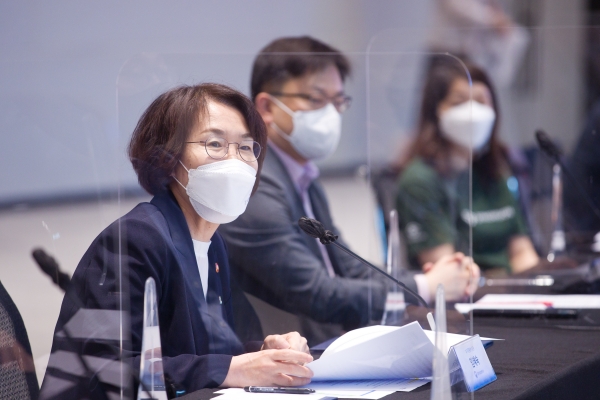
“We should support our National Assembly actively.” A high-ranking officer at SK Telecom said when he was meeting with internal lobbysts. He expressed that he was in favor of the 'Revision of the Broadcasting and Communication Development Framework Act', which designates the Internet Data Center (IDC) as a national disaster management facility.
An SKT employee who attended the meeting said, “I understand that the Ministry of Science and ICT made an all-out effort to pass the so-called amendment to the Framework Act on Broadcasting and Communication Development (IDC Surveillance Act) during the last National Assembly in the 20s. However, many communication companies were not happy about the IDC surveillance law."
Jo Ho-jin, CEO of Tachyon World, said, “The telecommunication fee licensing was the biggest means of restraining telecommunication companies except for the issuance of telecommunication business license and frequency auction by the Ministry of Science and ICT. Telecommunication companies wish that telecommunication fee to be converted from obtaining a license to reporting."

According to the Infostock Daily report, an official from the Ministry of Science and ICT met with a high-ranking SKT official and asked for cooperation to pass the "IDC Surveillance Act,"which was heavily opposed by related industries.
At the time, in the case of the original IDC Act, concerns were raised that the government could view the data in the IDC, and controversy arose as related industries strongly protested. In the industry, the government's granting of authority could have been considered a deterrent through "monitoring.".
At that time, when the Ministry of Science and ICT proposed a carrot measure to change the plan license in the form of a report, large telecommunication companies such as KT, SK Broadband, and LG Uplus turned in favor of a bill that could regulate IDC. In addition, they made the passage of the IDC Surveillance Act a fait accompli by deleting the clause on the authority to look into data.

In September, a senior official of the Ministry of Science and ICT explained the purpose of the re-promotion of the "Information and Communication Network Act Amendment (IDC Surveillance Act)" and asked for cooperation during the meeting with an executive from SKT. At that time, concerns were raised that the government could even see the data in IDC in the case of the IDC court bill, and related industries strongly opposed it, sparking controversy. This is because the government's empowerment could have been regarded as a deterrent through "monitoring" in the industry.
At that time, when the Ministry of Science and ICT promised to change that changed the telecommunication fee from licensing to reporting. Major telecommunication companies such as KT, SK Broadband, and LG U+ changed their stances and agree to the bill. In addition, bill excluded the data surveillance section in the bill, so many believe that the bill would pass with a doubt.
However, despite the Ministry's efforts, the IDC Monitoring Act was not passed at the National Assembly in January last year. Some Assemblymen expressed their disagreement by stating the bill was redundant and excessive governmental control.

"Unlike licensed telecommunication businesses such as SKT, the Ministry of Science and ICT does not have the legal ground to regulate secondary telecommunication businesses such as Naver and Kakao. If the IDC surveillance law is passed, the Ministry will be able to regulate Naver or Kakao like telecommunication companies," said Choi Yang-oh, an adviser at Hyundai Research Institute.
"If the Ministry wants to monitor all IDCs across the country, it must increase the headcount of the Ministry." Adviser Choi said. "The presidential election is the perfect time to recruitment for the experienced workers at large scale. The bill has some chance to be passed."
"We oppose the IDC Surveillance Act," an NHN official said. "If the bill is passed, it will create a lot of work for the industry."
"As the importance of data is growing day by day, the bill is being pushed forward. We cannot leave the regulation of IDCs only to the private sector," the official from the Ministry of Science and ICT said. "We will only monitor a physical security. We have no need to inspect internal data of the companies." However, a physical security of the IDC are sufficiently monitored by the current Information and Communication Network Act and the Fire Service Act.

"Reverse discrimination between foreign and domestic businesses will occur if the Act is passed," said Yoon Joo-ho, CEO of Umbrella Research. "Korean governement failed to acess and inspect the IDC even if it visited Google Korea twice."
The Korea Communications Commission, the predecessor of the Ministry of Science and ICT, dispatched an investigation team in 2011 and 2014 to review Google's illegal collection of location information and deletion of personal information. The team didn't gain the access to the IDC.
"The Ministry dispatched an investigation team to the Google IDC to calm the angry public. But the team didn't think that they would gain the access." the member of the dispatch team.
Based on the incident, Korean IDC operators are concerned that only Korean IDC operators will be subject to the regulation while Google or Meta won't. They all have the IDC in overseas.
Woo Ki-hoon, chairman of the Trade Subcommittee of the Korea Society of Technology and Innovation, pointed out, "It is a regressive and anti-market behavior of the government's idea of regulating only IDCs of Korean companies at a time when global companies such as Google and Apple are breaking down data borders and exerting enormous influence.". Chairman Woo also pointed out, "As the Ministry of Science and ICT focuses more on promotion work than regulation, it is desirable to encourage Google and Facebook to create IDCs in Korea in consideration of the IDC Promotion Act rather than promoting the IDC Surveillance Act."
Reporter Lee Ji-sun stockmk2020@gmail.com


